We will discuss the life of Chhatrapati Shivaji Maharaj, his transformation from a visionary leader to a revered king, his accomplishments, the values that shaped his vision, the significance of Chhatrapati Shivaji Maharaj Jayanti, and some English-language quotes that you can share with your loved ones on this day to honor the memory of this legendary warrior king.
The purpose of Chhatrapati Shivaji Maharaj Jayanti is to commemorate Shivaji Maharaj’s valiant and inspirational deeds. Shivaji’s character was greatly influenced by his mentor Dadaji Kondadeva and his mother Jijabai. From an early age, they instilled in him values such as bravery and fairness.
Shivaji demonstrated excellent military prowess and astute tactics as he grew older. He battled the oppressive Mughal and Adil Shahi dynasties that ruled over his people. He became a hero to the people because of his bravery and leadership. It was decided to commemorate his birthday in order to pay tribute to him and acknowledge his historical influence. It evolved into a national holiday that serves as a constant reminder of the value of bravery and resiliency.
Table of Contents
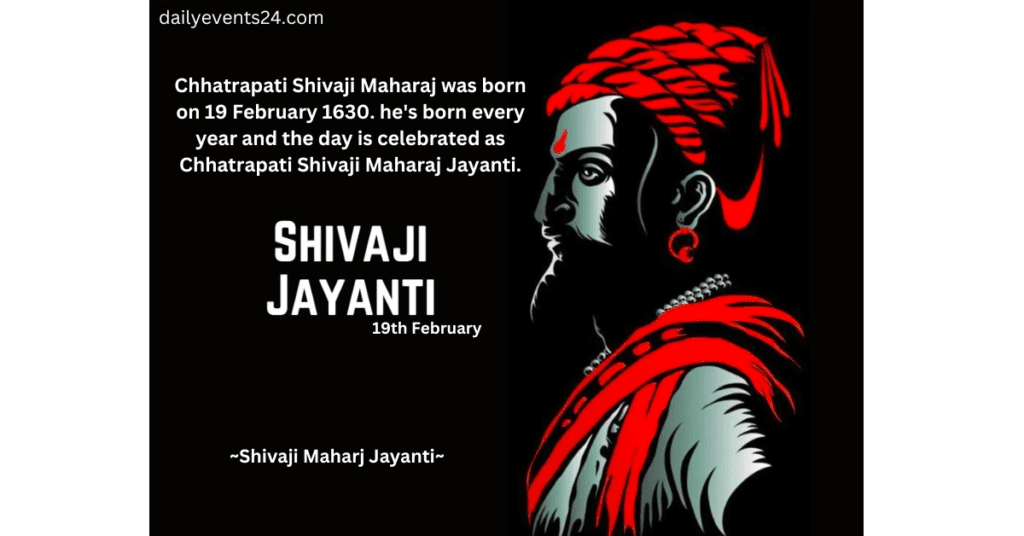
Easy Shivaji Jayanti Speech For Students ⬇️
About Chhatrapati Shivaji Maharaj Ji
| Official name | Chhatrapati Shivaji Maharaj Birth Anniversary |
|---|---|
| Also called | ShivJayanti, Chhatrapati Shivaji Maharaj Birth Anniversary. |
| Observed by | Predomentaly Maharashtrian and also Indians throughout the World. |
| Liturgical color | Saffron(Bhagwa) representing the Flag of the Hindavi Swarajya |
| Type | Historic, nationalistic |
| Significance | Celebrates the birth anniversary of Chhatrapati Shivaji Maharaj. |
| Celebrations | 1 Day |
| Observances | 2 times a year |
| Date | February 19th |
History – Beginning of Shivaji Jayanti
The commemoration of the birth anniversary of Shivaji Maharaj was initiated by the Mahatma Phule in 1870. The first Chhatrapati Shivaji Maharaj Jayanti was celebrated in Pune, marking the beginning of this tradition. Subsequently, Bal Gangadhar Tilak played a pivotal role in advancing this observance. Tilak, by emphasizing Shivaji Maharaj’s contributions and virtues, significantly influenced public perception and elevated his image in the eyes of the people.
Today, Chhatrapati Shivaji Maharaj Jayanti is a day of celebration, where people come together to honor Shivaji’s memory and find inspiration in his life. It’s not just about remembering a historical figure but also about celebrating the values he stood for – bravery, honesty, and fighting for what’s right.
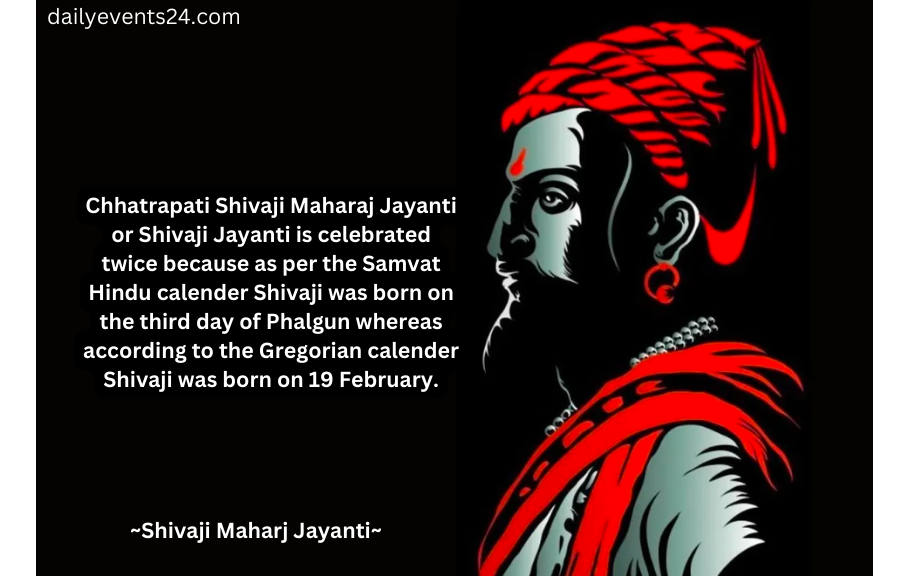

The generally acknowledged date of Chhatrapati Shivaji Maharaj’s birth, according to the Gregorian calendar, is February 19, 1630. It’s crucial to remember that many Hindus observe Shiv Jayanti in accordance with the Hindu calendar, which may indicate a different date every year. The Hindu calendar’s Chhatrapati Shivaji Maharaj Jayanti is based on the lunar cycle, so it changes every year.
The date of Chhatrapati Shivaji Maharaj Jayanti is very important because it is when Shivaji’s extraordinary journey began. His exemplary life and deeds have inspired generations, symbolizing courage, leadership, and resilience.
Birth Of Chhatrapati Shivaji Maharaj
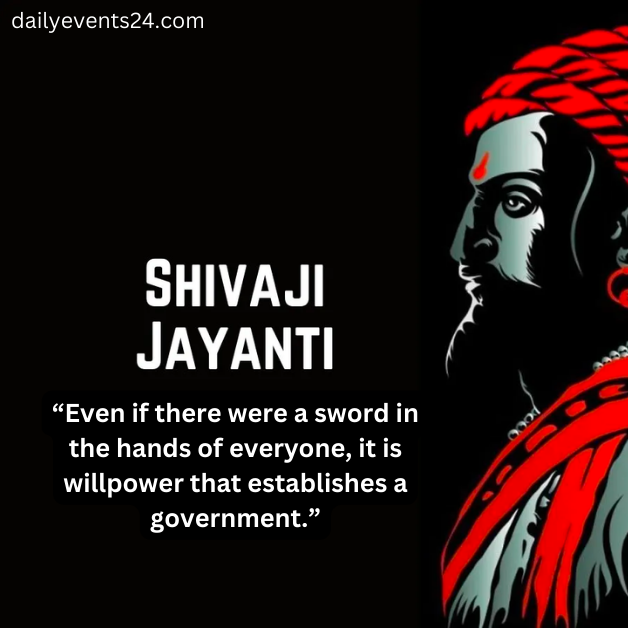

On February 19, 1630, Chhatrapati Shivaji Maharaj was born in the Shivneri fortress, which is located close to Junnar in modern-day Maharashtra, India. In the Deccan Sultanates, his father, Shahaji Bhosale, was a well-known Maratha general; Jijabai, on the other hand, was a powerful and pious woman, renowned for her strong character and unshakable dedication to her son’s upbringing.
Shivaji demonstrated extraordinary bravery and leadership abilities. Jijabai, his mother, was instrumental in molding his personality by instilling in him a strong sense of pride in his Maratha roots and the value of defending the rights of his community. Shivaji received an education that covered military training, religious teachings, and governance principles, all under the supervision of his mother and other mentors.
Dadaji Kondadeva, Shivaji’s mentor and a reliable counselor as well as a source of inspiration and direction, was one of his early influences. Shivaji learned a lot from Dadaji Kondadeva, who emphasised the value of honesty, bravery, and strategic thinking. He gave Shivaji a strong sense of responsibility to his people and a strong sense of justice and righteousness.
Shivaji’s natural leadership abilities became more and more apparent as he grew older. His followers respected and revered him for his extraordinary military prowess and strategic acumen. Shivaji set out to challenge the dominance of the Mughal and Adil Shahi rulers and establish an independent Maratha kingdom with a small group of devoted soldiers and supporters.
Achievements Of Shivaji Maharaj
Creation of the Maratha Empire
Chhatrapati Shivaji Maharaj’s vision extended far beyond merely resisting external oppression; he aspired to establish a sovereign Maratha Empire that would safeguard the interests and aspirations of his people. Despite facing formidable adversaries, including the mighty Mughal Empire, Shivaji embarked on a relentless campaign of conquest and consolidation, laying the foundations of what would become one of the most powerful empires in Indian history.
From its humble beginnings, Shivaji’s kingdom expanded rapidly under his astute leadership and military prowess. His strategic conquests encompassed vast territories, including Maharashtra, Konkan, parts of Karnataka, and significant portions of present-day southern India. Shivaji’s empire extended from Ramnagar in the north to Karwar in the south and from Baglana in the east to the Kanara region in the west, encompassing a diverse array of geographical and cultural landscapes.
Shivaji’s administrative genius was instrumental in maintaining the cohesion and stability of his burgeoning empire. He divided his realm into four distinct provinces, each under the jurisdiction of capable administrators tasked with overseeing governance and security. These provinces, comprising northern, southern, southeastern, and far southern regions, facilitated efficient administration and enabled Shivaji to extend his influence far and wide.
| Reign | 1674–1680 |
|---|---|
| Coronation | 6 June 1674 (first)24 September 1674 (second) |
| Predecessor | Position established |
| Successor | Sambhaji |
| dailyevents24.com | |
| Born | 19 February 1630 Shivneri Fort, Ahmadnagar Sultanate (present-day Maharashtra, India) |
| Died | 3 April 1680 (aged 50) Raigad Fort, Mahad, Maratha Empire (present-day Maharashtra, India) |
| Spouse | Sai Bhonsale(m. 1640; died 1659)Soyarabai (m. 1650)Putalabai (m. 1653)Sakvarbai (m. 1656)Kashibai Jadhav |
| Issue | 8, including Sambhaji and Rajaram I |
| House | Bhonsle |
| Father | Shahaji |
| Mother | Jijabai |
| Religion | Hinduism |
Shivaji’s Guerrilla Tactics Against the Mughals
In addition to securing tactical wins on the battlefield, Shivaji’s use of guerilla warfare techniques raised the spirits of his adherents. His invasions of Mughal lands, which included the pillage of Surat, sent shockwaves through the Mughal Empire, eroding its prestige and power.
Essentially, Shivaji’s establishment of the Maratha Empire and his proficiency with guerilla warfare techniques serve as a testament to his lasting influence as a military strategist and visionary leader. Generations after generation have been motivated by his accomplishments, which highlight the strength of fortitude, inventiveness, and unwavering determination in the face of hardship.
Shivaji Maharaj – Father of the Indian Navy
The 17th-century Maratha emperor Chhatrapati Shivaji Maharaj is revered for his noteworthy contributions to naval warfare as well as his military prowess on land. With good reason, he is acclaimed as the “Father of the Indian Navy” for his innovative approaches to maritime defense.
Shivaji Maharaj built a strong naval force around the Konkan and Goan coasts as a result of his awareness of the strategic value of naval might. Shivaji was proactive in securing his maritime borders because he realized how vulnerable his kingdom was to coastal attacks, especially from the Siddis of Janjira and European colonial powers.
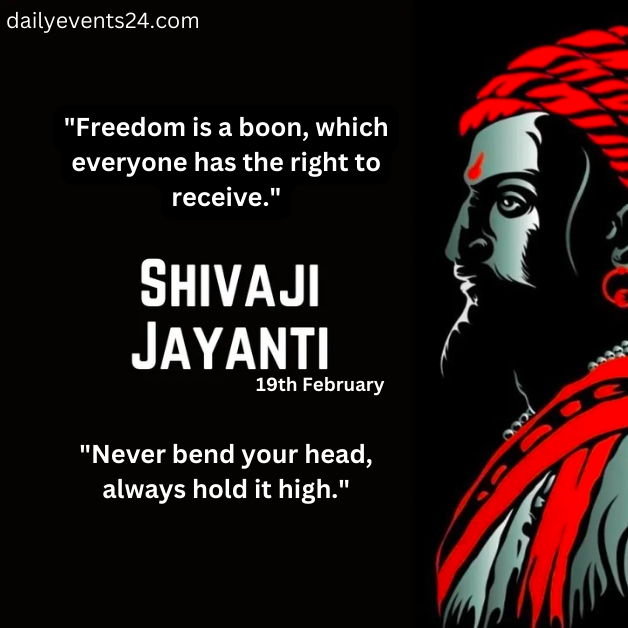

One of Shivaji’s most notable achievements was the construction of several sea forts and bases, including Sindhudurg, Vijaydurg, and Murud-Janjira. These forts served as strongholds for his naval operations, providing strategic positions for defence, repair, and storage of naval assets. Additionally, Shivaji Maharaj invested in the development of shipbuilding facilities in Kalyan, Bhivandi, and Goa, enabling the construction of a formidable fleet.
Read More:-
Shivaji Jayanti Speech In English 2024
Shivaji’s naval strategy included offensive operations in addition to defense in order to safeguard Indian trade interests and thwart foreign incursions. His fleet expanded to supposedly include hundreds of merchant, support, and combat vessels. It began with a variety of warships, including Manjuhas, Pal, Gurab, and Galivats. Shivaji successfully opposed the dominance of European naval forces in Indian waters and guaranteed the safety of maritime trade routes through his maritime endeavors.
The influence Shivaji Maharaj had on Indian naval history extended well beyond his own lifetime. His innovative tactics and dedication to constructing maritime defenses paved the way for India’s naval might, which is now essential to defending the country’s maritime interests.


Most Trusted Lieutenants Of Shivaji Maharaj
Shivaji Maharaj was renowned for his courage, strategic acumen, and sense of justice. His primary concerns were undoubtedly the establishment and defense of his kingdom, but historical narratives also speak of his kindness and concern for his subjects’ welfare. He put into effect a number of administrative changes, such as fair governance and equitable taxation, with the goal of enhancing the lives of his people. He was also reputed for helping those in need, including the building of temples and dharmshalas, which are resting places for travelers.
Tanaji Malusare:
Renowned Maratha warrior and military leader Tanaji was instrumental in many conflicts, most famously the Battle of Sinhagad. He gained particular notoriety for his audacious seizure of the Mughal Empire’s Kondana fort, which is now known as Sinhagad Fort. Maratha folklore extols Tanaji’s bravery and leadership, and he is frequently considered as one of Shivaji Maharaj’s most courageous commanders.
Baji Prabhu Deshpande:
Another important character in Shivaji Maharaj’s army was Baji Prabhu, who was renowned for his extraordinary military prowess and unwavering loyalty. He is most known for his valiant sacrifice made at the Battle of Pavan Khind, where he prevented Shivaji Maharaj from being killed by holding off a much larger Adil Shahi Sultanate force.
Netaji Palkar:
One of Shivaji Maharaj’s most dependable generals and military tacticians was Netaji Palkar. His participation was essential to many military campaigns and made a substantial contribution to the Maratha Empire’s territorial expansion. Numerous Maratha victories against stronger enemy forces were made possible by Netaji Palkar’s skill in guerilla warfare and battlefield tactics. Friends and foes alike respected and revered him for his strategic acumen and leadership abilities.
These lieutenants, like many others in Shivaji Maharaj’s army, were vital to the founding and upkeep of the Maratha kingdom because of their bravery, loyalty, and military prowess.
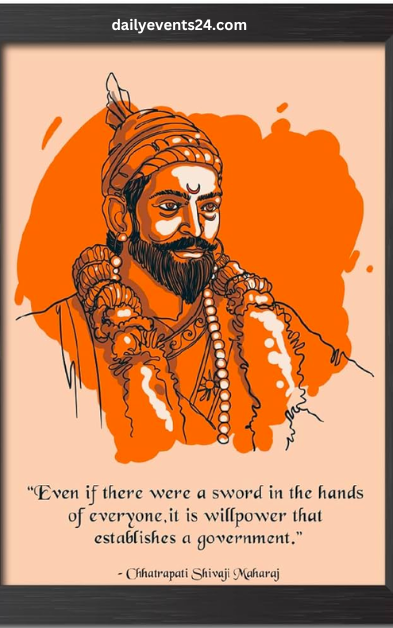

Chhatrapati Shivaji Maharaj Jayanti Quotes
Quotes about Chhatrapati Shivaji Maharaj Jayanti are also frequently posted and shared on social media, encouraging people to celebrate the day with pride and reverence. These quotes from Chhatrapati Shivaji Maharaj Jayanti, which are frequently ascribed to him or to distinguished academics and historians, serve as a reminder of Shivaji Maharaj’s lasting influence and the timeless lessons he taught.
Here are some examples of Chhatrapati Shivaji Maharaj Jayanti quotes in English:
‘Of all the rights of women, the greatest is to be a mother.’
‘Do not think of the enemy as weak, then do not be too scared to feel too strong.’
‘Never bend your head always hold it high.’
Easy Speech On Chhatrapati Shivaji Maharaj Jayanti
Shivaji Jayanti speech in English For You:-
Respected teachers and students, Good Morning/Evening/Afternoon to all:-
We are gathered here today to commemorate the life and legacy of one of the greatest warriors and visionaries in Indian history—Shivaji Maharaj Jayanti. Beyond simply being a monarch, Chhatrapati Shivaji Maharaj was a representation of bravery, tenacity, and valour. Millions of people are still motivated by his incredible accomplishments today.
Shivaji Maharaj fought valiantly to establish a just and prosperous kingdom and embodied the spirit of self-rule. His leadership was characterized by honesty, empathy, and a strong sense of responsibility to his people. He established a model for governance by upholding the values of justice, equality, and religious tolerance.
Let us consider Shivaji Maharaj’s teachings on this day and make an effort to live up to his ideals. Let’s preserve the spirit of harmony, combat injustice, and strive to make our society better. May Shivaji Maharaj’s legacy inspire future generations and lead us on the path of righteousness. Salutations, Bhavani! Salutations to Shivaji!
Chhatrapati Shivaji Jayanti Wishes
Individuals often exchange Chhatrapati Shivaji Maharaj Jayanti wishes with friends, family, and colleagues on this day, expressing their reverence for the great Maratha warrior and their aspirations for a society built on the values he espoused.
Here are some Chhatrapati Shivaji Jayanti wishes:-
- ‘On the auspicious occasion of Shivaji Jayanti, may the ideals of Chhatrapati Shivaji Maharaj inspire you to be courageous, just, and compassionate in all your endeavors. Wishing you a day filled with pride and reverence. Jai Shivaji!’
- ‘Happy Chhatrapati Shivaji Maharaj Jayanti! May the valor and wisdom of Chhatrapati Shivaji Maharaj guide you in overcoming obstacles and achieving greatness in your life. Let’s remember and honor his legacy today and always.’
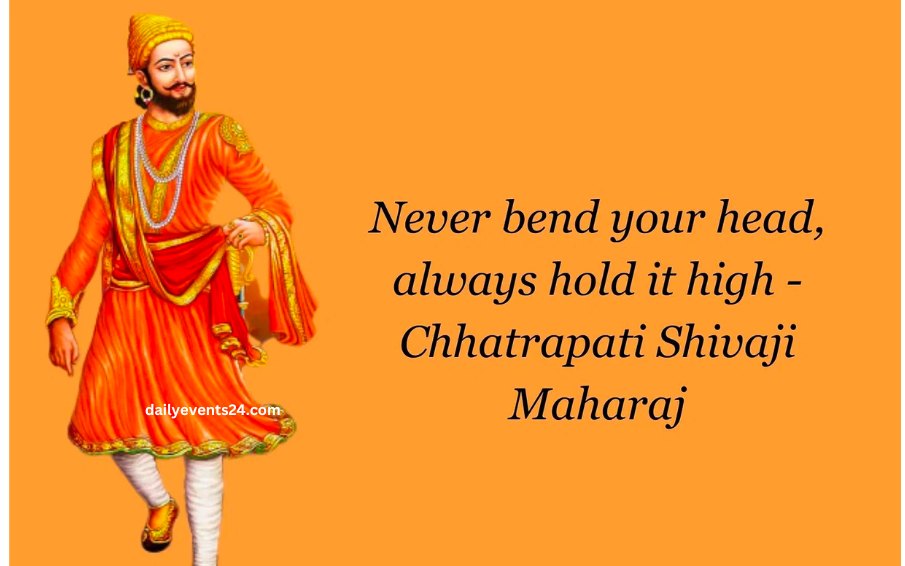

- ‘On this special day of Shivaji Jayanti, let’s salute the visionary leader who stood for justice, unity, and freedom. May we continue to draw inspiration from his teachings as we work towards creating a brighter future. Wishing you a memorable and empowering Shivaji Jayanti.’
- ‘Warm greetings on the occasion of Shivaji Jayanti! May the legacy of Chhatrapati Shivaji Maharaj inspire you to be fearless in the face of adversity, uphold justice, and serve humanity with compassion. Wishing you a day filled with reverence and pride. Jai Bhavani! Jai Shivaji!’
- ‘Happy Chhatrapati Shivaji Maharaj Jayanti to everyone! May the bravery, resolve, and patriotism embodied by Chhatrapati Shivaji Maharaj inspire us, guiding us towards a brighter future Let’s commemorate the birth of a true hero with reverence and joy!’
One of India’s most revered warriors and visionaries, Chhatrapati Shivaji Jayanti, is celebrated as a potent reminder of his unwavering spirit and enduring legacy. We are motivated by Shivaji Maharaj’s unwavering dedication to social welfare, equality, and justice as we celebrate the anniversary of his birth. His life is a shining example of the timeless virtues of bravery, resiliency, and leadership, inspiring and motivating future generations.
Frequently Asked Questions:- {Shivaji Jayanti 2024}
Q1:- Why do we Celebrate Shivaji Jayanti?
Answer:- Shivaji Jayanti is celebrated to honor and commemorate the birth anniversary of Chhatrapati Shivaji Maharaj, the legendary Maratha warrior king who lived during the 17th century.
Q2:- Who started the Shivaji Jayanti Celebration?
Answer:- Celebrations of Shivaji Jayanti were started by individuals who understood the significance of marking the birth anniversary of Chhatrapati Shivaji Maharaj, as well as by social and cultural organizations. Over time, the celebration gained popularity, especially in the state of Maharashtra, where numerous communities and groups actively planned events to pay tribute to the Maratha warrior king’s legacy.
Q3:- What role did Chhatrapati Shivaji Maharaj play in promoting cultural diversity?
Answer:- Chhatrapati Shivaji Maharaj was renowned for his inclusive policies, which supported religious tolerance and the coexistence of diverse communities within his kingdom, thus promoting cultural diversity.
Q4:- Are there any specific dishes associated with Shivaji Jayanti celebrations?
Answer:- Even though there might not be any special dishes made only for the occasion, people frequently cook traditional Maharashtrian food to honor Shivaji Maharaj’s cultural legacy.
Q5:- How has Shivaji Jayanti evolved over the years?
Answer:- Shivaji Jayanti celebrations have progressed from small-scale observances to larger-scale occasions, with a growing focus on cultural events, educational pursuits, and digital projects to reach a wider demographic.
Q6:- What lessons can we learn from the life of Chhatrapati Shivaji Maharaj today?
Answer:- The lessons that Chhatrapati Shivaji Maharaj’s life imparts to us about strategic thinking, leadership, and the value of sticking to your convictions in the face of difficulty make his legacy applicable in today’s world.
Q7:- Are there any virtual events or online platforms dedicated to Shivaji Jayanti celebrations?
Answer:- In recent years, there has been a rise in virtual events, webinars, and online platforms dedicated to Shivaji Jayanti. These provide a platform for global participation and discussions about Shivaji Maharaj’s legacy.
Q8:- How is Shivaji Jayanti celebrated in Maharashtra?
Answer:- Maharashtra celebrates with processions, cultural gatherings, and a recitation of Shivaji Maharaj’s accomplishments. People also go to the forts that are connected to him.
Q9:- What are some key achievements of Chhatrapati Shivaji Maharaj?
Answer:- Shivaji Maharaj is credited with forging a Maratha state that resisted foreign domination, building a powerful navy, and waging strategic guerrilla warfare. He also promoted religious tolerance.
Q10:- Are there any special rituals observed on Shivaji Jayanti?
Answer:- Even though there might not be any official religious ceremonies, a lot of people honor Shivaji Maharaj by going to his statues, taking part in cultural events, and having conversations about his legacy.
Q11:- Are there any special rituals observed on Shivaji Jayanti?
Answer:- Even though there might not be any official religious ceremonies, a lot of people honor Shivaji Maharaj by going to his statues, taking part in cultural events, and having conversations about his legacy.
Q12:- Is Shivaji Jayanti a public holiday in India?
Answer:- It is not a national public holiday on Shivaji Jayanti. In Maharashtra, on the other hand, where educational institutions might observe a holiday, it is celebrated with great fervor.
Q13:- How can one contribute to Shivaji Jayanti celebrations?
Answer:- Contributions can come from planning awareness campaigns, taking part in neighborhood gatherings, or lending support to projects that promote Shivaji Maharaj’s principles and teachings.
Q14:- What is the significance of Shivaji Maharaj’s forts?
Answer:- Strategically erected in the Sahyadri mountain range, Shivaji Maharaj’s forts are emblems of his military might and were instrumental in his military campaigns.
Q15:- Are there any movies or documentaries about Chhatrapati Shivaji Maharaj?
Answer:- Many documentaries and motion pictures have portrayed the life and accomplishments of Chhatrapati Shivaji Maharaj. “Swarajya Rakshak Sambhaji” and “Shivaji Maharaj Ki Jai” are a couple of the well-known ones.
For More Deep Knowledge about Chhatrapati Shivaji Maharaj Ji You Can visit here.
https://www.ketto.org/blog/chhatrapati-shivaji-maharaj-jayanti

